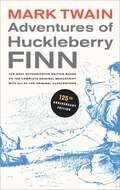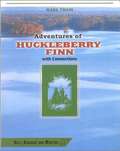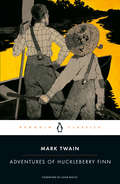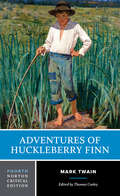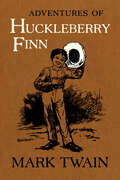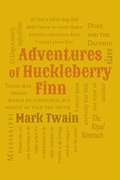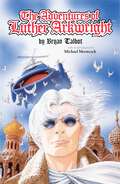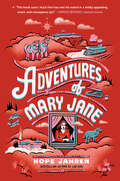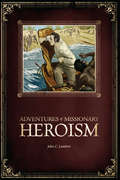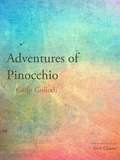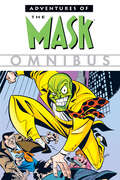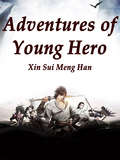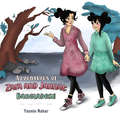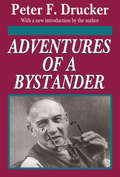- Table View
- List View
Adventures of Huckleberry Finn, 125th Anniversary Edition: The only authoritative text based on the complete, original manuscript (Mark Twain Library #9)
by Mark TwainThis 125th Anniversary edition of Adventures of Huckleberry Finn is expanded with updated notes and references and a selection of original documents—letters, advertisements, playbills—some never before published, from Twain's first "book tour" to promote its original publication. This is the only edition of Twain's masterpiece based on his complete manuscript, including the 663 pages found in a Los Angeles attic in 1990. It includes all of the illustrations commissioned by Mark Twain, historical notes, a glossary, maps, and selected manuscripts.
Adventures of Huckleberry Finn, with Connections
by Mark TwainThe Adventures of Huckleberry Finn is written entirely in dialect. Readers meet Huckleberry Finn after he's been taken in by Widow Douglas and her sister, Miss Watson, who intend to teach him religion and proper manners. Huck soon sets off on an adventure to help the widow's slave, Jim, escape up the Mississippi to the free states. By allowing Huck to tell his own story, Mark Twain addresses America's painful contradiction of racism and segregation in a "free" and "equal" society.
Adventures of Huckleberry Finn: New Edition - Adventures Of Huckleberry Finn By Mark Twain
by Mark Twain Azar Nafisi R. Kent RasmussenThis new edition of Huckleberry Finn, based on the recently discovered original handwritten manuscript, is destined to become the standard of this American classic. The volume inclues a discussion by Professor Victor Doyno, President of the Twain Circle and the author of a definitive book about the composition of this great novel, who will also conduct interviews across the country. Illustrations. (Literature)
Adventures of Huckleberry Finn: New Edition - Adventures Of Huckleberry Finn By Mark Twain (Norton Critical Editions #0)
by Mark Twain“I LOVE this book, as a reader, and I always enjoy teaching it. In the midst of current conversations and conflicts (Black Lives Matter and the responses to it, for example), its importance as a truly ‘American’ novel only grows.” —Anita Guynn, University of North Carolina at Pembroke This Norton Critical Edition includes: The American first edition text, plus the reinstated “raft passage” from Life on the Mississippi (1883), complete with all original illustrations by Edward Windsor Kemble and, for the raft passage, John Harley. Editorial matter by Thomas Cooley. A rich selection of contextual and source documents centered on the novel’s historical background, language, composition, and reception, four of them new to the Fourth Edition. Seventeen carefully chosen critical assessments of Mark Twain’s greatest work, ten of them new to the Fourth Edition. A chronology and a selected bibliography. About the Series Read by more than 12 million students over fifty-five years, Norton Critical Editions set the standard for apparatus that is right for undergraduate readers. The three-part format—annotated text, contexts, and criticism—helps students to better understand, analyze, and appreciate the literature, while opening a wide range of teaching possibilities for instructors. Whether in print or in digital format, Norton Critical Editions provide all the resources students need. “The materials and notations were excellent and useful. They often lead the students to further inquiry. It is a valuable text.” —Michael W. Carter, University of Kentucky “I have generally found the editorial annotations excellent. Overall I still find this the best critical edition of Huck Finn for my students.” —Shelly Jarenski, University of Michigan–Dearborn
Adventures of Huckleberry Finn: The Authoritative Text with Original Illustrations (Mark Twain Library #9)
by Mark TwainA beautiful hardcover repackaging of this timeless classic from the publishers of the Autobiography of Mark Twain and in partnership with the Mark Twain Project. This definitive edition of Adventures of Huckleberry Finn was the only version of Mark Twain’s masterpiece based on his complete manuscript, including the 663 pages found in a Los Angeles attic in 1990. Prepared by the Mark Twain Papers, the official archive of Sam Clemens’s papers at the University of California, Berkeley, this volume features the gorgeous original illustrations that Twain commissioned from Edward Windsor Kemble and John Harley and also includes historical notes, a glossary, maps, selected manuscript pages, and even a gallery of letters, advertisements, and playbills from Twain’s first "book tour" to promote the original publication—everything the discerning reader needs to enjoy this classic of American literature again and again.
Adventures of Huckleberry Finn: Vocabulary From Literature (Dover Thrift Editions #Vol. 8)
by Mark TwainReferring to Adventures of Huckleberry Finn, H. L. Mencken noted that his discovery of this classic American novel was "the most stupendous event of my whole life"; Ernest Hemingway declared that "all modern American literature stems from this one book," while T. S. Eliot called Huck "one of the permanent symbolic figures of fiction, not unworthy to take a place with Ulysses, Faust, Don Quixote, Don Juan, Hamlet."The novel's preeminence derives from its wonderfully imaginative re-creation of boyhood adventures along the mighty Mississippi River, its inspired characterization, the author's remarkable ear for dialogue, and the book's understated development of serious underlying themes: "natural" man versus "civilized" society, the evils of slavery, the innate value and dignity of human beings, the stultifying effects of convention, and other topics. But most of all, Adventures of Huckleberry Finn is a wonderful story - filled with high adventure and unforgettable characters (including the great river itself) - that no one who has read it will ever forget.
Adventures of Huckleberry Finn: Vocabulary From Literature (Wordsworth Classics #Vol. 8)
by Mark TwainOne of the most popular books of all-time, Adventures of Huckleberry Finn has been both venerated and vilified since it was first published in 1885. The story of a young abused boy on the run and his friendship with a runaway slave is about loyalty, compassion, and doing what is right, and it remains one of Mark Twain's greatest achievements.
Adventures of Jake #1
by Jeff AdamsJake is a pretty typical college students. He studies a lot, works two jobs and would like to find the right guy to share it all with.Work and love collide when the man he’s had a crush on comes into the comic book store where he works looking for a birthday present. They run into each other again at a birthday party where Jake’s been hired to entertain kids wearing a superhero costume.Will Jake’s love of comics and superheroes get in the way of winning Michael’s heart? Or is Michael looking for a super man to put some fire into his life?
Adventures of Little Joe Otter
by Thornton W. BurgessAdventures of Little Joe Otter by Thornton W. Burgess
Adventures of Luther Arkwright (2nd edition)
by Bryan TalbotAcross a multitude of parallel universes, dark forces operate in the shadows, manipulating mankind&’s histories throughout countless timelines. The agents of these Disruptors all work with a single purposethe recovery and activation of Firefrost, a longhidden doomsday device whose unspeakable power is capable of consuming the galaxy in all its incarnations. Standing in the way of the Disruptors is Luther Arkwright, a human anomaly who exists only in a single universe, a man of vast psychic powers and capable of travelling between the parallel realities to counter the Disruptor&’s malign influence. But the Disruptors are aware of Arkwright and his abilities, and while Arkwright searches the myriad Earths for the location of Firefrost, the agents of darkness race to destroy Arkwright . . . and to ensure their unthinkable ends. In celebration of the 30th Anniversary of the first publication of The Adventures of Luther Arkwright, this new edition features entirely new scans from the original artwork that restore much of the lost detail from previous editions. Arkwright has never looked better! * Nominated for three Eisner Awards and five Eagle Awards.
Adventures of Mary Jane
by Hope JahrenIn this brand new reimagining, Mary Jane—the red-headed spark from Mark Twain's Adventures of Huckleberry Finn, who stole Huck's heart in just 30 pages—comes to life with her own story of adventuring down the Mississippi River in the 1840s.Meet Mary Jane Guild — she&’s on a dangerous and unpredictable adventure down the Mississippi River — and she&’ll steal Huck Finn&’s heart along the way.In his classic work Adventures of Huckleberry Finn, Mark Twain briefly introduces "Mary Jane, the red-headed one." In no time Mary Jane becomes the girl Huck thinks about "a many and a many million times." Now author Hope Jahren has created for Mary Jane a life as vivid and compelling as Huck's.These pages will show you the real Mary Jane. A girl on her own dangerous, unpredictable journey down the Mississippi River in pre-Civil War America. Equipped with an uncanny ability for mathematics, a talent for sewing, and a bale of beaver skins, Mary Jane navigates deadly illnesses, angry mobs, treacherous landowners, outright thieves and swindlers, and more than a thousand miles of muddy water. What&’s more, she thrives in the face of these challenges, thanks to support from strangers who become friends. Traveling solo requires Mary Jane to grow up fast, but it ultimately leads her to a new resilience, a love of adventure, deep and enduring sisterhood, and a blue-eyed, ponytailed boy she can&’t stop thinking about.Jahren offers a wealth of layered characters and deeply researched, authentic details of changing times in the North and South. Using the language and style of Twain and shifting the point of view to a smart and determined young woman, she explores timeless themes of duty, family, romance, and betrayal, with grit and courage at the core.
Adventures of Mind and Mathematics (Mathematics in Mind)
by Wolff-Michael RothThis monograph uses the concept and category of “event” in the study of mathematics as it emerges from an interaction between levels of cognition, from the bodily experiences to symbolism. It is subdivided into three parts.The first moves from a general characterization of the classical approach to mathematical cognition and mind toward laying the foundations for a view on the mathematical mind that differs from going approaches in placing primacy on events.The second articulates some common phenomena–mathematical thought, mathematical sign, mathematical form, mathematical reason and its development, and affect in mathematics–in new ways that are based on the previously developed ontology of events. The final part has more encompassing phenomena as its content, most prominently the thinking body of mathematics, the experience in and of mathematics, and the relationship between experience and mind. The volume is well-suited for anyone with a broad interest in educational theory and/or social development, or with a broad background in psychology.
Adventures of Missionary Heroism: True Stories Of The Intrepid Bravery And Stirring Adventures Of Missionaries With Uncivilized Man, Wild Beasts, And The Forces Of Nature In All Parts Of The World
by John C LambertBe inspired by stirring true accounts of famous missionaries! During the 19th century, many courageous and faithful missionaries were traveling to the ends of the earth to spread the Gospel. They braved innumerable dangers, toils, and tragedies. Originally published in 1912, each chapter within this volume is devoted to ). missionary and provides a biography, as well as stories of their time in the field. Meet over 20 inspiring individuals of faith Discover their call to missions service and their sacrifices Explore the dangers and challenges of these pioneering servants of Christ In addition, the book also highlights the work these believers accomplished, such as translating the Bible, providing medical aid, and converting people to Christianity. This book covers missionaries from around the world and from several different Christian denominations who served in Asia, Africa, North America, South America, and the Pacific. May these stories of those who have gone before inspire and encourage the current and future ranks of Christians, both young and old alike, to give everything for the sake of Jesus Christ.
Adventures of Perception: Essays / Interviews
by Scott MacdonaldIn this collection of thematically related personal essays and conversations with filmmakers, the author takes us on a fascinating journey into many under-explored territories of cinema.
Adventures of Pinocchio
by Carlo CollodiThe Adventures of Pinocchio is a novel for children by Italian author Carlo Collodi, written in Florence. The first half was originally a serial in 1881 and 1882, and then later completed as a book for children in February 1883. It is about the mischievous adventures of Pinocchio, an animated marionette; and his poor father, a woodcarver named Geppetto. It is considered a classic of children's literature and has spawned many derivative works of art, such as Disney's 1940 animated movie of the same name, and commonplace ideas such as a liar's long nose.
Adventures of Rap Kid 2: The hilarious, high-energy series from the viral rapping sensation (The Adventures of Rap Kid)
by MC Grammar"FUN, FRESH and THUMPING with ENERGY" - Jeff Kinney, bestselling author of Diary of a Wimpy Kid"MC Grammar is IT. He is the MAN!" - Michael RosenDrop the mic for the second book in the hilarious, high-energy bestselling series from multi-award-winning teacher and vital rapping sensation MC Grammar. Fresh from their Golden Mic Rap Battle win, Rap Kid and SFX must solidify their status as Rap GOATs. With a little help from Mr G, Paige Turner – the school librarian, and an unexpected new friend can the dream-team beat some of the best wordsmiths in history and become the true greatest of all time? Get ready for the biggest rap battles in history in this epic adventure. Let&’s go, My G!
Adventures of Sneaky Mouse
by Ava CocchiThis story takes place outside your window, as you walk your dog, your postman delivers your mail, your friends ride their bikes past your house. If you look super close, I mean with super-duper binoculars, you will find a tiny, brave mouse sneaking around your neighborhood to protect his friends and family in their villages.His name is Luca, but everyone calls him Sneaky Mouse. Sneaky Mouse loves cheese! All kinds of cheese: blue, mozzarella, cheddar, goat, but not American – American cheese is not cheese in mouse-houses! Originally Sneaky Mouse and his friends, Ciara, Rocco, and Julian, would sneak into your homes to find leftover cheese to fill their bellies, but one day Sneaky Mouse realized he was needed in his village called Mouse Wood for more than just cheese. He realized he could save lives.Of course, like all superheroes, Sneaky realized he can&’t save everyone, and that gave him a lot of anxiety. Read how the neighborhood mouse becomes a hero amongst his fellow mice and overcomes his own fears and anxiety.
Adventures of The Mask Omnibus
by Michael EuryLife in Edge City has always been tough for Stanley Ipkiss. He's as good-natured and decent as they come, but nice don't pay the bulldog or make points with the ladies. Stanley knows he's destined for greater things, but how to get there? Enter the Mask, an ancient artifact that imbues its wearer with the power to do just about anything one desires — especially if one desires zoot suits, pies, mallets, cartoon bug-eyes, and a penchant for Latin song stylings! Stanley Ipkiss now has the world on a string, but there are many in that world of vastly lesser niceness than Stanley who desire the Mask's power for themselves. With great power comes big trouble... and even bigger laughs!
Adventures of Tom Sawyer
by Mark TwainAdventure in three acts based on the novel by Mark Twain. Great for young audiences.
Adventures of Uncle Wiggily: Adventures Of The Rabbit Gentleman With The Mother (Dover Children's Classics)
by Howard Garis Louis WisaGenerations of children and adults have thrilled to the adventures of Uncle Wiggily Longears, the gentleman rabbit. These heartwarming tales from a century ago recount Uncle Wiggily's devotion to helping children and animals--and himself--out of perilous scrapes. The wise old rabbit saves the day, using a combination of wit, sincerity, positive thinking, and other timeless virtues.This beautiful keepsake edition features 19 of Uncle Wiggily's most popular exploits, all accompanied by vivid colorful versions of the original illustrations. The two-color images have been given new life with wonderfully vibrant tones that add to the fun of Uncle Wiggily's adventures. Join the old gentleman rabbit's family circle--including Sammie and Susie Littletail, the bunny children; the puppies Jackie and Peetie Bow-Wow; and Billie and Johnnie Bushytail, the squirrel boys--for fun in their forest home. And when Dr. Possum advises Uncle Wiggily to travel, you, too, can come along to discover other fields and forests and meet new friends.
Adventures of Young Hero: Volume 1 (Volume 1 #1)
by Xin SuiMengHanIt was a martial arts world that had heroes, money, beauties, power, and plots! Let's see how a young man from another world would act amidst so many beauties, powers, and schemes! Our goal: to get the prettiest girl; to wear the best clothes; to practice the best martial arts. All of this was contained in "Confusion of the Heroic Assassins"
Adventures of Young Hero: Volume 2 (Volume 2 #2)
by Xin SuiMengHanIt was a martial arts world that had heroes, money, beauties, power, and plots! Let's see how a young man from another world would act amidst so many beauties, powers, and schemes! Our goal: to get the prettiest girl; to wear the best clothes; to practice the best martial arts. All of this was contained in "Confusion of the Heroic Assassins"
Adventures of Young Hero: Volume 3 (Volume 3 #3)
by Xin SuiMengHanIt was a martial arts world that had heroes, money, beauties, power, and plots! Let's see how a young man from another world would act amidst so many beauties, powers, and schemes! Our goal: to get the prettiest girl; to wear the best clothes; to practice the best martial arts. All of this was contained in "Confusion of the Heroic Assassins"
Adventures of Zara and Jannat: Bangladesh
by Yasmin NaharIn a little house by the sea, two sisters, Zara and Jannat, wanted to have a kite adventure. Going through the boxes in Mum’s shed, they make the perfect kite. Little do they know that today, a big adventure awaits them. Fly away with Zara and Jannat to Bangladesh, where a fabulous adventure awaits.
Adventures of a Bystander
by Peter DruckerPeter Drucker's lively and thoughtful memoirs are now available in paperback with a new introduction by the author. He writes with wit and spirit about people he has encountered in a long and varied life, including Sigmund Freud, Henry Luce, Alfred Sloan, John L. Lewis, and Marshall McLuhan. After beginning with his childhood in Vienna during and after World War I, Drucker moves on to Europe in the 1920s and early 1930s, describing the imminent doom posed by Hitler and the Nazis. He then goes on to describe London during the 1930s, America during the New Deal era, the World War II years, and beyond.According to John Brooks of The New York Times Book Review, "Peter Drucker is at a corner cafe, delightfully regaling anyone who will listen with tales of what must be one of the more varied—and for a practitioner of such a narrow skill as that of management counseling, astonishing—of contemporary professional lives." Dorothy Rabinowitz of the Washington Post writes, "The famous are here as well as the infamous.... All are the beneficiaries, for better or for worse, of Drucker's unerring eye for psychological detail, his remorseless curiosity, and his imaginative sympathy.... Drucker's book appears in a stroke to have restored the art of the memoir and of the essay."Adventures of a Bystander reflects Drucker's vitality, infinite curiosity, and interest in people, ideas, and the forces behind them. His book is a personal and informal account of the rich life of an independent man of letters, a life that spans eight decades and two continents. It will be of interest to scholars and professionals in the business world, historians, sociologists, and admirers of Peter Drucker.
